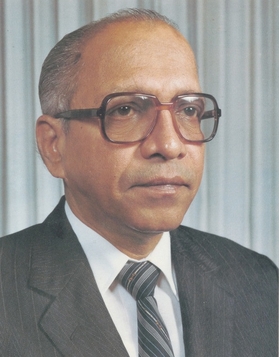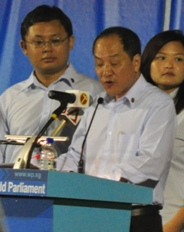Related Research Articles

The politics of Singapore takes the form of a parliamentary representative democratic republic whereby the President of Singapore is the head of state, the Prime Minister of Singapore is the head of government, and of a multi-party system. Executive power is exercised by the cabinet from the parliament, and to a lesser extent, the President. Cabinet has the general direction and control of the Government and is accountable to Parliament. There are three separate branches of government: the legislature, executive and judiciary abiding by the Westminster system.

The People's Action Party is a major conservative centre-right political party in Singapore and is one of the two contemporary political parties represented in Parliament, along with its main opposition, the Workers' Party.

Joshua Benjamin Jeyaretnam, more commonly known as J. B. Jeyaretnam or J.B.J., was a Singaporean politician and lawyer. He was the leader of the Workers' Party from 1971 to 2001.

The Workers' Party of Singapore, also simply known as the Workers' Party, is a major centre-left social-democratic and democratic socialist political party in Singapore. Since 2011, the Workers' Party has been the only opposition party in Singapore to have elected MPs in Parliament.

The Democratic Action Party, or DAP, is a multi-racial, centre-left Malaysian political party advocating social democracy and secularism, social justice, progressivism, and multi-racialism. One of the component parties of the Pakatan Harapan (PH) coalition, it was an opposition party for 51 years until PH won the 2018 Malaysian general election and formed the federal government. However, before the coalition finished its first term, defections from partnering PH component parties caused it to lose power after 22 months, culminating in the 2020 Malaysian political crisis. As of 24 February 2020, DAP is the largest party in Malaysia's Dewan Rakyat.

Devan Nair Chengara Veetil, also known as C. V. Devan Nair, was a Malaysian-Singaporean politician. He served as the third President of Singapore & the commander-in-chief of the Singapore Armed Forces serving a three-year term from 23 October 1981 to 28 March 1985. He was elected by the Parliament of Singapore to be the next President of Singapore when former president Benjamin Henry Sheares stepped down from the position. Nair was sworn in as president on 23 October 1981. On 28 March 1985, Nair resigned in unclear circumstances.

Dr. Lee Siew Choh was a Singaporean politician and medical doctor. Initially a member of the People's Action Party (PAP), he became a leader of the breakaway Socialist Front in 1961. After the Socialist Front merged with the Workers' Party in 1988, Lee stood as a Workers' Party candidate in the 1988 general election and became Singapore's first Non-Constituency Member of Parliament (NCMP), serving in this role until 1991.

The Singapore People's Party is a political party in Singapore.

There are currently two types of elections in Singapore: parliamentary and presidential elections. According to the constitution of Singapore general elections for parliament must be conducted within 3 months of the dissolution of parliament, which has a maximum term of 5 years from the first sitting of parliament, and presidential elections are conducted every 6 years.

Low Thia Khiang is a Singaporean politician and businessman.

A Nominated Member of Parliament (NMP) is a Member of the Parliament of Singapore who is appointed by the President. They are not affiliated to any political party and do not represent any constituency. There are currently nine NMPs in Parliament. The introduction of NMPs in September 1990, effected to bring more independent voices into Parliament, was an important modification of the traditional Westminster parliamentary system that Singapore had.

A Non-constituency Member of Parliament (NCMP) is a member of a Singaporean opposition political party who, according to the Constitution and Parliamentary Elections Act, is declared to have been elected a Member of the Parliament of Singapore despite having lost in a general election by virtue of having been one of the best-performing losers. NCMPs enjoy most of the privileges of ordinary Members of Parliament.

General elections were held in Singapore on 21 September 1963, five days after the merger with Malaysia. The elections saw the Malaysian ruling party, United Malays National Organisation (UMNO), backed with Singapore Alliance Party (SAP) in an attempt to oust the People's Action Party (PAP), after violating previous agreement not to do so and a highlight in the relations between UMNO and the PAP. However, the result was a victory for the PAP, which won 37 of the 51 seats in the Singapore Legislative Assembly. The 1963 election was the only election to date with no boundary changes to any of the 51 existing constituencies.

The Parliament of the Republic of Singapore and the President jointly make up the legislature of Singapore, which is based on the Westminster system. Parliament is unicameral and is made up of Members of Parliament (MPs) who are elected, as well as Non-constituency Members of Parliament (NCMPs) and Nominated Members of Parliament (NMPs) who are appointed. Following the 2015 general election, 89 MPs and three NCMPs were elected to the 13th Parliament. Nine NMPs were appointed during the first session of this Parliament. The first sitting of the 13th Parliament took place on 15 January 2016.

A group representation constituency (GRC) is a type of electoral division or constituency in Singapore in which teams of candidates, instead of individual candidates, compete to be elected into Parliament as the Members of Parliament (MPs) for the constituency. The Government stated that the GRC scheme was primarily implemented to enshrine minority representation in Parliament: at least one of the MPs in a GRC must be a member of the Malay, Indian or another minority community of Singapore. In addition, it was economical for town councils, which manage public housing estates, to handle larger constituencies.

Singapore's general election to form its 12th Parliament was held on 7 May 2011. The Parliament of Singapore's maximum term is five years, within which it must be dissolved by the President of Singapore and elections held within three months, as stated in the Constitution of Singapore. Voting is mandatory in Singapore and is based on the first-past-the-post system. Elections are conducted by the Elections Department, which is under the jurisdiction of the Prime Minister’s Office. On 19 April 2011, President S.R. Nathan dissolved parliament. Nomination day was held on 27 April 2011, and for the second election in a row, the PAP did not officially return to power on nomination day, but it did return to power on the polling day. This election also marked the first and the only three-cornered fight since 2001 in Punggol East SMC before it increased to four-cornered fight on a by-election held two years later.

Halimah binte Yacob is a Singaporean politician serving as President of Singapore since 2017. Previously a member of the governing People's Action Party (PAP), she was a Member of Parliament (MP) for Jurong GRC from 2001 to 2015 and for Marsiling-Yew Tee GRC (Marsiling) from 2015 to 2017. She was the 9th Speaker of the Parliament of Singapore from 2013 to 2017, which she resigned to participate in the 2017 Singapore presidential election. Halimah won in an uncontested election, as no other presidential candidate was issued the Certificate of Eligibility. She was sworn in the following day becoming the first female president in the country's history and the second Muslim since Yusof Ishak in 1965.

By-elections in Singapore are elections held to fill seats in the Parliament of Singapore that fall vacant in between general elections, known as casual vacancies. In the past, the Government of Singapore took the position that the Prime Minister had discretion whether or not a by-election should be called to fill a casual vacancy in a Single Member Constituency, and could leave a parliamentary seat unfilled until the next general election. However, in the case of Vellama d/o Marie Muthu v. Attorney-General (2013), which arose from a vacancy in Hougang Single Member Constituency, the Court of Appeal held that the Constitution of Singapore obliges the Prime Minister to call a by-election unless a general election is going to be held in the near future. However, a by-election need only be called within a reasonable time, and the Prime Minister has the discretion to determine when it should be held.
Lily Tirtasana Neo is a Singaporean medical practitioner and politician. A member of the People's Action Party (PAP), Neo is a Member of Parliament (MP) for the Kreta Ayer-Kim Seng constituency within Jalan Besar Group Representation Constituency (GRC).
Seow Peck Leng was a Singaporean politician, educator and advocate for women's rights. She was one of the first women members of parliament in Singapore and the only woman of an opposition party at the time.
References
- ↑ "1st Parliament 08.12.1965 - 08.02.1968". Parliament of Singapore. Archived from the original on 16 November 2016. Retrieved 1 July 2016.
- ↑ Yong, Judith (5 December 1965). "Make-up of parliament". The Straits Times. p. 6. Retrieved 1 July 2016– via NewspaperSG.